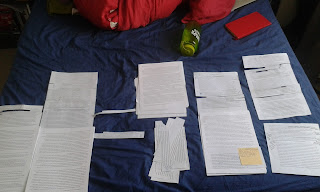Part of the stress came from having two people whose work I immensely enjoy and respect as examiners. It's usually a mistake to meet your heroes, but passing up the chance to have them read my work just because I was afraid they would prove mortal seemed silly, or at least it did last summer when I was filling in the paperwork. On the train up to Norwich I was pretty certain that they'd tell me to rewrite the entire thing - and on some level I wished that they would tell me to rewrite the entire thing, as coming back to it after three months made all the flaws painfully clear.
I may have spent the hour before the actual viva sitting in a remote corner of the university campus quietly singing rounds, because singing is the best way to keep yourself from hyperventilating, keeling over, and missing whatever it is that's got you nervous. Or so I've been told.
When I turned up at the internal examiner's office door on Thursday afternoon they seemed positively friendly.
And then they told me that I'd passed.
And then they told me that, more than finding the thing adequate, they'd actually enjoyed it.
And then it turned into a really interesting conversation about free speech and culture and religion and the limits of legal action and the capacity of fiction to address those things that can't be quantified but which nevertheless influence the tide of history. Philosophy and theory didn't even get a look-in, and no one asked about the books that I hadn't read.
They didn't really give me corrections - two sentences to delete and some stray typos to correct - so I suppose the next thing to do is get the final, bound version to the university with all of its accompanying paperwork in time to be included on the next pass list, so I can graduate this summer with all of the people I know and like. And I suppose I should start looking for academic posts of a shape that I could fit myself to. And I should probably start thinking about writing another novel. And now that the thesis is done it needs to be broken down into journal articles, or else built up into a monograph, so it can do someone else some good. And maybe one of these days I'll actually unpack.
But right now my brain is mush, and I've forgotten how to talk. So I'll probably work on peace negotiations with my stomach, and leave everything else 'til next week.


















